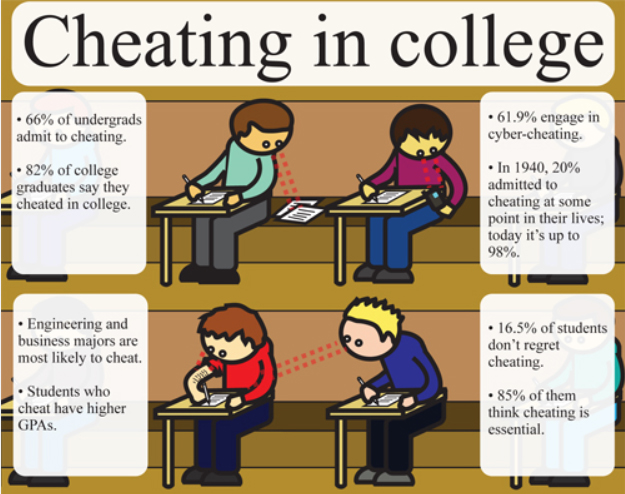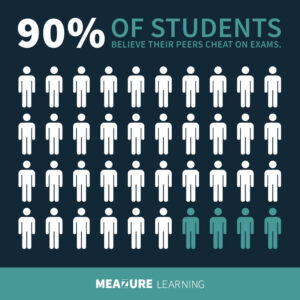Hunting Down the CHEATERS!!!!

 In recent years, colleges across the nation have been grappling with a growing epidemic of academic dishonesty among students. From plagiarism to unauthorized collaboration during exams, cheating has become alarmingly prevalent, raising concerns about the erosion of academic integrity and its broader impact on society. A recent study sheds light on the staggering consequences of this trend, highlighting the urgent need for proactive measures to address this issue.
In recent years, colleges across the nation have been grappling with a growing epidemic of academic dishonesty among students. From plagiarism to unauthorized collaboration during exams, cheating has become alarmingly prevalent, raising concerns about the erosion of academic integrity and its broader impact on society. A recent study sheds light on the staggering consequences of this trend, highlighting the urgent need for proactive measures to address this issue.
Statistics: According to a nationwide survey conducted by the Higher Education Research Institute (HERI), nearly 68% of college students admitted to engaging in some form of cheating during their academic careers. This alarming statistic underscores the pervasive nature of academic dishonesty and its widespread acceptance among students.
Furthermore, data from the National Center for Educational Statistics (NCES) reveals that instances of cheating have been steadily increasing over the past decade, with a 15% rise in reported cases since 2010. This troubling trend underscores the need for colleges to implement robust policies and enforcement mechanisms to combat cheating effectively.
Impact on Academic Institutions: The prevalence of cheating poses significant challenges for colleges and universities, undermining the integrity of academic programs and devaluing the degrees earned by honest students. When academic standards are compromised, the credibility of institutions comes into question, jeopardizing their reputation and standing within the higher education community.
Moreover, cheating erodes trust between faculty and students, creating an atmosphere of suspicion and cynicism that detracts from the learning experience. Academic institutions must work tirelessly to uphold the principles of honesty and integrity, fostering a culture of academic excellence that values intellectual rigor and ethical conduct.
Impact on Students: The consequences of cheating extend far beyond academic sanctions, impacting students' personal and professional development in profound ways. Research has shown that students who cheat are more likely to struggle with ethical decision-making in their careers, leading to potential ethical lapses and professional misconduct down the line.
Furthermore, the psychological toll of cheating can be significant, leading to feelings of guilt, shame, and self-doubt among students who succumb to the pressure to cheat. These negative emotions can have long-lasting effects on students' mental health and well-being, compromising their overall academic performance and personal fulfillment.
Call to Action: Addressing the root causes of cheating requires a multifaceted approach that involves collaboration between colleges, faculty, students, and policymakers. Colleges must prioritize the implementation of proactive strategies to deter cheating, such as strengthening academic integrity policies, promoting ethical conduct through educational initiatives, and utilizing technology to detect and prevent cheating.
Additionally, fostering a culture of academic honesty and integrity requires collective effort and commitment from all stakeholders. Faculty members must educate students about the importance of ethical behavior and hold them accountable for upholding academic standards. Students, in turn, must take responsibility for their actions and resist the temptation to cheat, recognizing the long-term consequences of dishonesty on their academic and professional futures.
In conclusion, the detrimental effects of cheating in college are far-reaching and demand urgent attention from the higher education community. By working together to address this pressing issue, colleges can uphold the integrity of their academic programs and empower students to succeed with honesty and integrity.
Impact of Academic Dishonesty on Businesses: A Statistical Analysis

While the consequences of academic dishonesty are often discussed within the context of educational institutions, its ripple effects extend far beyond campus boundaries, impacting businesses that employ individuals with a history of cheating. Through a statistical lens, we delve into the tangible effects of academic dishonesty on businesses, shedding light on the challenges they face in maintaining integrity within their workforce.
Statistics:
- Loss of Productivity: According to a survey conducted by the Association of Certified Fraud Examiners (ACFE), businesses lose an estimated 5% of their annual revenue to fraud, which includes instances of academic dishonesty among employees. This loss of productivity translates to billions of dollars annually, underscoring the significant financial impact of cheating on businesses.
- Legal Liabilities: Research by the Ethics Resource Center (ERC) reveals that companies with employees who engage in unethical behavior, such as cheating, are more likely to face legal liabilities and regulatory scrutiny. This exposes businesses to costly litigation, fines, and damage to their reputation, further exacerbating the financial repercussions of academic dishonesty.
- Erosion of Trust: A study published in the Journal of Business Ethics found that organizations employing individuals with a history of academic dishonesty experience a decline in trust among stakeholders, including customers, investors, and partners. This erosion of trust can have far-reaching consequences, impacting business relationships and hindering growth opportunities.
- Quality of Work: Research conducted by the Harvard Business Review indicates that employees who engage in unethical behavior, such as cheating, are more likely to exhibit poor work performance and deliver substandard results. This compromises the quality of products and services offered by businesses, leading to dissatisfied customers and diminished competitiveness in the market.
- Employee Turnover: Studies have shown that businesses that fail to address ethical lapses within their workforce experience higher rates of employee turnover. Employees who witness or experience unethical behavior, such as cheating, are more likely to seek employment elsewhere, resulting in increased recruitment and training costs for businesses.
Conclusion: The statistical evidence presented underscores the profound impact of academic dishonesty on businesses, ranging from financial losses and legal liabilities to erosion of trust and compromised quality of work. As custodians of integrity within the workplace, businesses must prioritize ethical conduct and take proactive measures to identify and address instances of academic dishonesty among employees. By fostering a culture of honesty and integrity, businesses can safeguard their reputation, enhance productivity, and sustain long-term success in an increasingly competitive global landscape.
What should be done:
Colleges and school boards should bear the responsibility of ensuring academic integrity and must be held liable for any breaches thereof, facing multi-million-dollar lawsuits as consequences. Teachers who fail in their duty to uphold academic honesty should also face repercussions, including termination of employment.
Furthermore, the impact of cheating extends beyond the classroom, affecting businesses that may hire individuals who have engaged in academic dishonesty. When businesses unknowingly employ cheaters, they are exposed to various risks and consequences. Cheating undermines the trust and integrity within the workplace, leading to potential financial losses, damaged reputation, and legal liabilities. Employees who cheat may lack the necessary skills and competencies required for their roles, resulting in decreased productivity and substandard work quality. Moreover, if these individuals resort to fraudulent practices within the company, it could lead to severe legal ramifications, tarnishing the organization's credibility and potentially causing financial harm.
In light of these implications, businesses should have the right to take legal action against employees who have misrepresented their qualifications through cheating. Such actions ensure accountability and protect the interests of the employer, safeguarding the integrity of the hiring process and the overall functioning of the business.
It is imperative for schools and teachers to actively combat cheating and ensure that academic dishonesty is not rewarded or overlooked. Schools should implement rigorous measures to detect and prevent cheating, including utilizing AI technology to scan assignments for irregularities. Teachers must diligently investigate suspected cases of cheating and impose appropriate sanctions to uphold academic standards and integrity.
Moreover, schools should refrain from rewarding or endorsing students who engage in cheating behavior. This includes refraining from awarding scholarships, honors, or other accolades to individuals with a history of academic dishonesty. Additionally, when students transition into the workforce, schools should provide accurate and transparent records regarding their academic performance, ensuring that businesses can make informed hiring decisions based on the candidates' true capabilities and integrity.
By holding schools, teachers, and students accountable for maintaining academic honesty and integrity, we can mitigate the adverse effects of cheating on businesses and society as a whole. This collaborative effort ensures that individuals are held responsible for their actions and promotes a culture of honesty, trust, and fairness in both educational and professional environments.

Transforming Education: Overcoming the Pitfalls of Lazy Teaching
In the realm of education, the role of teachers is paramount in shaping the learning experiences of students. However, the prevalence of lazy teaching practices, particularly in assessment methods, poses significant challenges to student engagement and academic growth. This article explores the shortcomings of lazy teaching, particularly in testing methods, and advocates for the implementation of essay-based assessments as a solution to foster deeper learning and critical thinking skills among students.
Identifying Lazy Teaching: Lazy teaching manifests in various forms, but one common trait is the reliance on passive assessment methods that fail to stimulate intellectual curiosity or promote meaningful learning. Multiple-choice tests, fill-in-the-blank quizzes, and rote memorization tasks dominate classrooms, providing a superficial measure of students' comprehension while neglecting the development of essential skills such as critical thinking, analysis, and communication.
The Pitfalls of Traditional Testing: Traditional testing methods often prioritize regurgitation of information over genuine understanding, leading to a culture of surface-level learning and academic complacency. Moreover, these assessments fail to account for the diverse learning styles and abilities of students, perpetuating inequities and stifling academic growth.
The Case for Essay-Based Assessments: Essay-based assessments offer a more holistic approach to evaluating student learning, allowing for deeper exploration of concepts, synthesis of ideas, and articulation of original thoughts. By requiring students to construct coherent arguments, support their claims with evidence, and engage in critical reflection, essays foster higher-order thinking skills essential for success in both academia and the workforce.
Benefits of Essay-Based Assessments:
- Critical Thinking: Essays encourage students to analyze complex issues from multiple perspectives, fostering critical thinking skills essential for navigating real-world challenges.
- Creativity: Unlike standardized tests, essays provide students with the freedom to express their creativity and originality, allowing for more nuanced responses and diverse perspectives.
- Communication Skills: Writing essays enhances students' communication skills, including clarity of expression, organization of ideas, and effective use of language, which are valuable assets in any professional setting.
- Authentic Assessment: Essays offer a more authentic assessment of student learning, allowing teachers to gauge comprehension, analytical ability, and mastery of course content in a comprehensive manner.
Implementing Change: To address the prevalence of lazy teaching and promote essay-based assessments, educators must prioritize professional development, provide resources and support for curriculum redesign, and cultivate a culture of innovation within educational institutions. By embracing alternative assessment methods that prioritize depth over breadth, educators can empower students to become active participants in their own learning journey, fostering a lifelong love of learning and intellectual curiosity.
Conclusion: Lazy teaching practices, particularly in assessment methods, hinder student engagement, stifle academic growth, and perpetuate inequities within education systems. By embracing essay-based assessments, educators can transcend the limitations of traditional testing methods, foster deeper learning experiences, and equip students with the critical thinking skills necessary for success in an increasingly complex and interconnected world. Through collective action and a commitment to transformative pedagogy, we can unlock the full potential of education to inspire, empower, and enrich the lives of students worldwide.
Holding colleges accountable
 for addressing issues related to lazy teaching practices and ineffective assessment methods requires a multifaceted approach that prioritizes transparency, accountability, and continuous improvement. Here are some strategies for holding colleges liable and ensuring they take proactive measures to address these challenges:
for addressing issues related to lazy teaching practices and ineffective assessment methods requires a multifaceted approach that prioritizes transparency, accountability, and continuous improvement. Here are some strategies for holding colleges liable and ensuring they take proactive measures to address these challenges:
- Regulatory Oversight: Government regulatory bodies responsible for overseeing higher education institutions should establish clear guidelines and standards for academic integrity and assessment practices. Colleges should be required to demonstrate compliance with these standards through regular audits and assessments conducted by independent accrediting agencies.
- Financial Penalties: Colleges found to be perpetuating lazy teaching practices or failing to address issues related to ineffective assessment methods should face financial penalties, such as fines or loss of funding. These penalties would serve as a deterrent and incentivize colleges to prioritize student learning and academic excellence.
- Transparency and Reporting: Colleges should be required to publicly disclose information about their assessment practices, including the types of assessments used, assessment criteria, and outcomes. This transparency would enable students, parents, and stakeholders to make informed decisions about which colleges to attend and hold institutions accountable for their academic standards.
- Professional Development: Colleges should invest in ongoing professional development opportunities for faculty members to enhance their teaching skills and stay abreast of best practices in assessment and pedagogy. This could include workshops, seminars, and mentorship programs focused on effective assessment methods, active learning strategies, and the use of technology in teaching.
- Student Feedback Mechanisms: Colleges should implement robust feedback mechanisms that allow students to provide input on their learning experiences, including assessment methods and teaching effectiveness. This feedback should be used to inform continuous improvement efforts and ensure that colleges are responsive to the needs and preferences of their students.
- Promotion of Academic Integrity: Colleges should actively promote a culture of academic integrity and ethical conduct among students, faculty, and staff. This could include educational initiatives on plagiarism and cheating, the development of honor codes and academic integrity policies, and the implementation of measures to deter and detect academic dishonesty.
- Evaluation and Accountability: Colleges should establish mechanisms for evaluating the effectiveness of their assessment practices and holding faculty members accountable for upholding academic standards. This could include peer evaluations of teaching effectiveness, student performance data analysis, and regular reviews of assessment practices by departmental or institutional committees.
By implementing these strategies, colleges can be held liable for addressing issues related to lazy teaching practices and ineffective assessment methods, ensuring that they uphold academic integrity and provide students with high-quality learning experiences. This holistic approach to accountability will ultimately benefit students, faculty, and society as a whole by fostering a culture of excellence and continuous improvement in higher education.
Can a business sue them?
Businesses can pursue legal recourse against students who cheat and the colleges that fail to address academic dishonesty through several avenues. Here are some potential legal actions:
- Breach of Contract: If a student has obtained a degree or certification through fraudulent means, businesses may have grounds to argue that the student has breached the implied contract that exists between educational institutions and their students. Businesses could pursue legal action against the student for misrepresentation and seek damages for any losses incurred as a result of hiring an unqualified candidate.
- Fraudulent Misrepresentation: Businesses may have a claim for fraudulent misrepresentation against students who falsify their academic credentials or misrepresent their qualifications during the hiring process. This could include misrepresenting grades, academic achievements, or degrees obtained. Businesses could seek damages for any losses suffered as a result of relying on false information provided by the student.
- Negligent Misrepresentation: Colleges that fail to take adequate measures to prevent academic dishonesty may be liable for negligent misrepresentation. If a business hires a student based on the assumption that the college has maintained academic integrity and later discovers that the student cheated to obtain their qualifications, they may have grounds to pursue legal action against the college for negligence.
- Breach of Duty of Care: Colleges owe a duty of care to their students to provide a fair and honest academic environment. If colleges fail to uphold this duty by turning a blind eye to cheating or failing to implement adequate measures to prevent academic dishonesty, businesses may have a claim for breach of duty of care. This could include claims for damages resulting from hiring unqualified candidates or reputational harm suffered as a result of employing individuals with fraudulent qualifications.
- Defamation: In cases where businesses suffer reputational harm as a result of hiring individuals with fraudulent qualifications, they may have a claim for defamation against the student or the college. This could include false statements made by the student regarding their academic achievements or false assurances provided by the college regarding the integrity of their academic programs.
- Consumer Protection Laws: Businesses may be able to leverage consumer protection laws to hold colleges accountable for deceptive practices related to academic integrity. This could include claims under state or federal laws prohibiting unfair or deceptive acts or practices in commerce.
It's important to note that the specific legal recourse available to businesses will vary depending on the circumstances of each case and the applicable laws in their jurisdiction. In many cases, businesses may choose to pursue alternative dispute resolution methods, such as mediation or arbitration, to resolve disputes related to academic dishonesty. Consulting with legal counsel experienced in education law and employment law can help businesses assess their options and determine the best course of action.
Here is an idea to make it stop:
 Creating a financial incentive for students to report instances of cheating could be implemented through a collaborative effort between colleges and law enforcement agencies. Here's a formulation of how such a system could work:
Creating a financial incentive for students to report instances of cheating could be implemented through a collaborative effort between colleges and law enforcement agencies. Here's a formulation of how such a system could work:
- Establishment of Reporting Mechanism: Colleges would set up an anonymous reporting system where students can submit tips or evidence of academic dishonesty. This could be through an online portal or a dedicated hotline managed by the college's academic integrity office.
- Verification Process: Upon receiving a report, the college's academic integrity office would investigate the allegations to determine their validity. This would involve gathering evidence, interviewing witnesses, and assessing the credibility of the information provided.
- Reward System: If the investigation confirms that academic dishonesty has occurred and the information provided by the student leads to disciplinary action against the cheater, the reporting student would be eligible for a financial reward. The reward amount could vary depending on the severity of the cheating incident and the impact it had on the academic integrity of the institution.
- Funding Source: Colleges could allocate funds from their budget to finance the reward system. Additionally, partnerships could be established with law enforcement agencies or private organizations interested in promoting academic integrity. These entities could contribute to a reward pool dedicated to incentivizing students to report instances of cheating.
- Collaboration with Law Enforcement: Law enforcement agencies could offer their support by providing resources for investigating more serious cases of academic fraud, such as large-scale cheating schemes or the production and sale of counterfeit academic credentials. In such cases, students who provide valuable information leading to successful prosecutions could receive higher rewards.
- Promotion and Awareness Campaigns: Colleges and law enforcement agencies would conduct awareness campaigns to educate students about the importance of academic integrity and the role they can play in upholding it. This would include promoting the reporting mechanism and highlighting the benefits of reporting cheating, both for the individual student and the broader academic community.
By implementing a financial incentive system for reporting academic dishonesty, colleges and law enforcement agencies can create a culture of accountability and integrity within educational institutions. This approach not only discourages cheating but also empowers students to take an active role in preserving the value of their education and ensuring a fair and level playing field for all.




